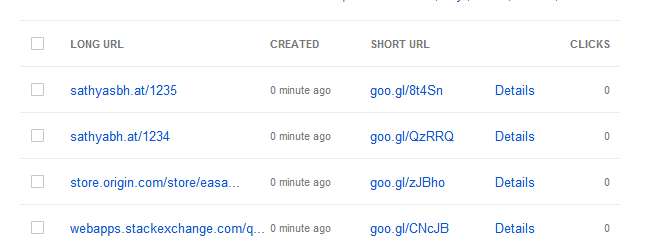Google has a shortening service at http://goo.gl/ which let's you convert a long URL to a short one. It says the following about the URLs it generates:
All goo.gl URLs and click analytics are public and can be accessed by anyone.
I understand that the URLs are not private. However, the above does not specify the difference between a publicized, sequential, or secret URL. Below I will define what I mean by each of these terms. Notice how their definitions make them mutually exclusive. Which of these, then, best describes what goo.gl uses?
Say I use goo.gl and get the URL http://goo.gl/abc57.
Publicizing:
If Google has a page such as http://goo.gl/list-all which has all of the URLs that have been generated, then I would consider that to be publicizing the URL. Or if there were a page that listed URLs by category, or by number of visits, etc. that would also be considered publicizing the URL. If Google has an API that lets people access this information, then I would also consider that publicizing the URL.
Sequential:
If Google distributes URLs in a sequential manner, then it is really easy to get a list such as the publicized version above. For example, if someone got the URL http://goo.gl/abc58, they could enter in the previous URL, http://goo.gl/abc57, and easily see the link I just generated. If it is both sequential and publicized, publicized would trump this definition, since it's much easier to use the publicized page than randomly looking through a sequence.
Secret:
The URLs Google generates are random enough to not be sequential (i.e. so it's not easy to guess them), and they are not publicized anywhere. Therefore, while it is possible that someone could access the link I just generated, it's not probable since it would involve pure chance. In other words, I can assume that when I generate a goo.gl URL no one will know about it unless the URL is specifically shared with them.
Private:
These would be links that can only be accessed by people you intend to share the URL with. (E.g. it may require a login and password). Google's service is obviously not a private one, since it states that above.
Notes:
- There is a page that lists all of your generated URLs. If you are the only one that can view this page, that would not necessarily mean that the service is publicized. If there is any way for someone else to view these details (e.g. via an API), that means that the service is publicized; unless it is very difficult to view this page (e.g. they need a secret ID associated with your account which they can't easily get unless you give it to them).

